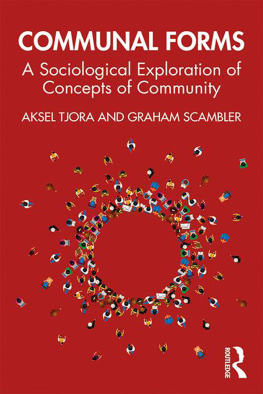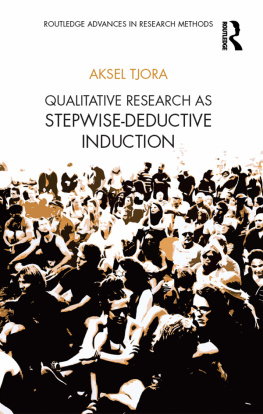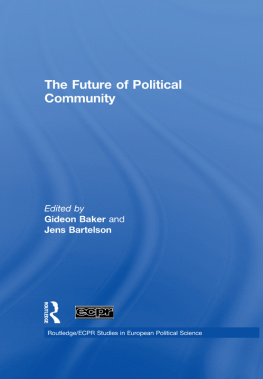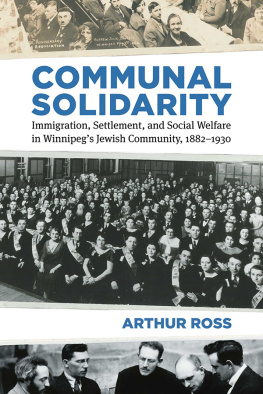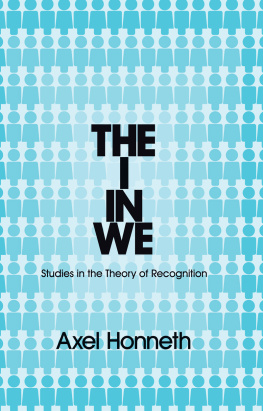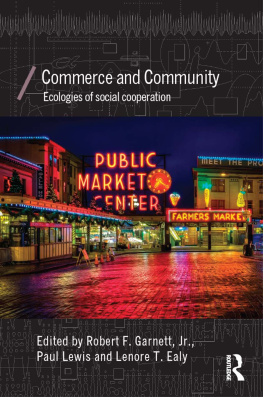Communal Forms
Drawing on a wide range of social theory, as well as empirical inputs from studies of work, neighbourhoods, events, meeting places and online self-help groups, this book suggests that communal forms are constructed on the basis of communicative, material, biographic-cultural, practice-based, and situational layers. The concept of community has long provided an important point of departure for the discipline of sociology, with the conflicting conceptions of community before and into modernity embodied in Ferdinand Tnnies Gemeinschaft and Gesellschaft and in Emile Drkheims Mechanical and Organic Solidarity, providing the focus for debate. Other contributors have maintained an interest in communities as communions, interactional competencies, symbolic identification, tribal connection, and more recently communication. Drawing on such theoretical contributions, as well as empirical inputs, the authors develop a more nuanced concept of community, based on the notion that it is constructed from several different layers. This concept is then presented as a sociological toolbox with which to fuel approaches to examining societal challenges and change. Providing a fresh approach to a core sociological question that also has a wider societal relevance, Communal Forms will be of interest to scholars and students concerned with social issues, and for those with a more general interest in community, society and its development over time.
Aksel Tjora is Professor of Sociology at the Norwegian University of Science and Technology (NTNU) and founder and director of the Sociology Clinic in Trondheim.
Graham Scambler is Emeritus Professor of Sociology at UCL, and a Visiting Professor of Sociology at Surrey University.
First published 2020
by Routledge
2 Park Square, Milton Park, Abingdon, Oxon OX14 4RN
and by Routledge
52 Vanderbilt Avenue, New York, NY 10017
Routledge is an imprint of the Taylor & Francis Group, an informa business
2020 Aksel Tjora and Graham Scambler
The right of Aksel Tjora and Graham Scambler to be identified as authors of this work has been asserted by them in accordance with sections 77 and 78 of the Copyright, Designs and Patents Act 1988.
All rights reserved. No part of this book may be reprinted or reproduced or utilised in any form or by any electronic, mechanical, or other means, now known or hereafter invented, including photocopying and recording, or in any information storage or retrieval system, without permission in writing from the publishers.
Trademark notice: Product or corporate names may be trademarks or registered trademarks, and are used only for identification and explanation without intent to infringe.
British Library Cataloguing-in-Publication Data
A catalogue record for this book is available from the British Library
Library of Congress Cataloging-in-Publication Data
A catalog record has been requested for this book
ISBN: 978-0-367-43891-3 (hbk)
ISBN: 978-0-367-43892-0 (pbk)
ISBN: 978-1-003-00628-2 (ebk)
To
our families
our friends
our neighbourhoods
and all good communal forces
While the concept of community is very close to everyones experiences of belonging or feeling excluded, the discipline of sociology has much to offer to put such experiences under a more analytical lens. With this book, we suggest a many-sided conceptualisation of community, in which communal forms are represented and experienced as solidarity, integration, social interaction, identification, communication, work and physical proximity.
This book is a collaborative development of the book Hva er fellesskap [What is community], authored by Aksel Tjora, published in Norwegian by Universitetsforlaget, 2018. It has been in progress for a long time and draws on a range of theories across the history of sociology, our own research in various fields, as well as personal experiences. Dramatic events during 2011, such as the Norwegian terror attacks of 22 July, the Occupy movements in the US and riots in several British cities, triggered intensified work on the book. The discipline of sociology should be able to explore, understand and explain at least some aspects of such incidents, and we hope we have contributed with relevant perspectives.
In addition to a sociological analysis, in the last chapter we share our concerns about current social developments and how these may be understood sociologically. It is our hope that our contribution is not only for the fellow academics, but also for fellow politically-minded citizens in our societies.
Trondheim/London
Aksel Tjora and Graham Scambler
This text has been germinating for many years and is the product of a series of research projects motivated by our curiosity about various forms of community. We have personally experienced good communities, and also a lack of community, courtesy of living, studying, and working across various sites and in relation to different environments and events. We soon arrive at a sense of community, or note the lack of it, as a natural part of being a human. In many ways, community is a fundamental feature of life; but at the same time, it is difficult to create. Many people search for community aspire to belong, to feel part of something greater and occasionally may take initiatives themselves to create or nurture good communities, often with unpredictable results. That community is both important and difficult is perhaps the reason why assorted academic disciplines like sociology, anthropology, political science, geography, psychology, religious studies and many others each have their own approach to this particular phenomenon. And this difficult and unpredictable, yet so immediate, aspect of community holds a deep fascination for us as sociologists a fascination more than deep enough to fill more than a book.
Our overriding aim in this book is to understand and come to terms with community in a diverse, detailed and nuanced sense, as well to commend it as a tool for more general and wide-ranging social analyses. To achieve this, we draw special inspiration from the domain of sociology and from research across various contexts and settings, such as organisations and work communities, local communities, neighbourhoods and boroughs, public arenas such as cafs, and festivals and media.
In our own research we often study the origin and maintenance of community peripheries. Our fascination lies precisely in boundaries especially those between insiders and outsiders and in how such boundaries are created, change or remain static. We have been interested in this question in relation to organisations, urban environments, cafs and festivals, the use of communication media and the definition of the healthy versus the ill. These boundary zones represent borders between what or who are included or excluded from a community. The varying clarity of many of these boundaries is in itself of interest from a sociological perspective: the boundaries are endless, between good and poor working environments, between pleasant and inhospitable parks, between everyday life and festivals, between illness and health, between those who are popular and those who are pushed out, between the bully and the victim. In sociology we often speak of these boundaries as socially constructed, a concept inspired by the sociologists Peter Berger and Thomas Luckmann (1966). This does not mean that they are not real and genuine, but that their significance and our understanding are developed through social processes or through negotiation during mundane, everyday interpersonal interaction. The boundaries, and thus the communities, are formed by habits, norms, class and social positioning in general, gender, law, bureaucracy, trades and professions, time and place, technologies and so on.

